|
Music in the Confederate
Navy
|
Presented at the 10th
Annual Mystic Seaport Museum Maritime Music Symposium, June 10, 1989
By
John Townley
Music
sung and played
on shipboard in the 19th century has been widely researched and written
about,
including many specialty areas such as songs of the whalers, fishing
songs,
naval ballads, and the like. Most,
although they may be more narrowly defined by a given segment of the
maritime
profession, cover a fairly broad expanse of time.
The
Navy of the Confederate
States Of America was only in existence for a little over four years
and in
toto numbered only about six
thousand men (as compared, say, to the
C.S.
Army's 600,000), so tracing music and songs in this narrow window might
seem
like a near impossibility. This
particular search is compounded by the fact that Southerners tended to
keep
written records of their activities less voluminously than their
cousins to the
North, being members of a culture with a strong oral but limited
written
tradition. In addition, much
of the
records that were kept during the war were destroyed in the devastation
that
marked its conclusion.
Nevertheless,
there
are enough references in books, journals, letters, and printed music to
give a
fairly suggestive picture of the music that accompanied the Southern
sailor to
war on the high seas and on the rivers and harbors of his home country. These,
in combination with a look at the
overall musical culture of the time, give a good idea of the music to
which the
CSN sailor was exposed or, in fact, penned himself and left for future
generations.
References
to music in
the CSN vary from a word or two dropped in passing to substantial words
of
praise for music aboard ship and the positive effect it had on the
sailors. A few on the
sketchy side
would be:
In
his journal,
Executive Officer of the C.S.S. Chattahoochie
docked at
Chattahoochie,
Florida on Feb. 18, 1863 notes that he heard the sailors on deck
singing a
song, and he quotes a verse:
"You
had better stay at
home with the girly you love so dear,
Than venture your
sweet life in a bold privateer."
He
also notes that the
ship had two fiddlers aboard -- one, the paymaster, was a classical
fiddler,
the other, the surgeon, played breakdowns.
Similar
notes in passing
are made in the journal of Assistant Surgeon Charles E. Lining on board
the
last CSN commerce raider C.S.S. Shenandoah:
"Monday,
May 1st, 1865, at sea lat. 33o01'20"N,
150o48'15"E....old Chew [5th Lt. Francis F. Chew] went fiddling in the
evening to the captain's while Lee [3rd Lt. Sidney Smith Lee] went to
work and
danced all his clothes off -- I don't know when I have laughed as much
as I did
at it." Later he observes:
"Saturday,
Oct. 21, 1865...At night Lee
got all the dancers among the men by the main hatch and by a little
whiskey set
them dancing until after nine o'clock."
Even
sketchier
conclusions may be made about another ship, the cruiser C.S.S. Georgia,
because
a reference by Capt. Raphael Semmes mentions Lt. R.T. Chapman aboard
the cruiser
C.S.S. Sumter as one who
"thrumbed
the light guitar, and sang delightful songs" and who, incidentally
subsequently served aboard the Georgia. Did
he bring his guitar?
Songs
were certainly
being sung aboard the cruiser C.S.S. Florida,
as a topman
aboard her
actually wrote a song of her exploits while under the command of Capt.
James
Newland Maffit, one of the most dashing and daredevil captains of the
CSN. The ballad
appears in The Civil War
In Song
and Story, 1889, credited anonymously and is set not quite as the text
suggests
to the "Red, White and Blue, (Southern edition)" -- there was such a
song, a parody on "Columbia, The Gem Of The Ocean" -- but to the tune
of the also very popular "Red, White, and Red." The
song survived in oral tradition into
this century and was collected in a version very close to the original
by
Joanna Colcord (thanks for that to Bob Webb, who found it in her
unpublished
papers a few years back). [Below, right, is the complete original text]
If
musical references
aboard some ships are scanty, one makes up for all the rest: the C.S.S.
Alabama. The
most
famous of all Southern raiders, her
depredations upon Northern shipping still hold the world's record for
all
commerce raiders today. Built in
Liverpool, England (like many other CSN ships) and commanded by captain
and
lawyer Raphael Semmes, she was more than a fearsome scourge to Yankee
shipping
-- she was one of the most musical naval ships of the 19th century, at
least
for which there is documentation.
Her
musical tale
begins before she made her hairbreadth escape from the Mersey River to
the
freedom of the open ocean, just hours ahead of an injunction that would
have
seized her. Union agents in
Liverpool
were collecting evidence to present to the British Crown that the
Confederacy
was building a warship in Britain in violation of that country's
neutrality
laws. American Consul
to Liverpool Thomas
Dudley had hired various spies to watch and infiltrate the operation,
among them seaman William Passmore. Passmore
reports his observations of June 26, 1862:
"Met
the seamen,
say thirty in number, on Saturday coming down Canning St. [in
Birkenhead] from
the ship from the ship, playing 'Dixie's Land' on a fife, concertina,
and
cornopeon [an early cornet] and they all took the 4:30 Woodside boat
for Liverpool. They still kept
playing
'Dixie's Land' on
board the ferry boat. Went up to one of
the men and asked him when he thought the ship would be going out. He
told me their bed clothes and bedding
were aboard and that the boatswain told those who intended to go in
her, to
hold themselves in readiness for early next week."
A
merry lot, indeed --
if all three instruments actually did make it aboard when she slipped
down the
Mersey on the 29th, then the Alabama had likely the only concertina in
the
Confederate Navy -- the instrument was almost unheard of in America
before the
Civil War, when it was brought to the North by Irish and German
immigrants
imported to help fight the war.
The
next reference to
music on the Alabama
is at her commissioning at Terceira in the
Azores
the following month, just after her tender had transferred her armament. On
Sunday, Aug. 24th, Semmes relates:
"A
curious
observer would also have seen a quartermaster standing by the English
colors,
which we were still wearing, a band of music on the quarter-deck, and a
gunner
(lock-string in hand) standing by the weather-bow gun.
All
these men had their eyes upon the reader
[Semmes reading the commission]; and when he had concluded, at a wave
of his
hand, the gun was fired, the change of flags took place, and the air
was rent
by a deafening cheer from officers and men; the
band at the same time, playing 'Dixie,' -- that
soul-stirring
national anthem of the new-born government."
No
mention is made of
what comprised this band, but fife, cornopeon and other brass were
common on
most ships of the period, along with various drums, and maybe in this
case a
concertina!
But
that was just for
official purposes. Once safely at
sea,
Semmes goes on to describe the routine on board ship and how he kept
the
sometimes idle hands of the crew busy:
"But
though I
took good care to see that my men had plenty of employment, it was not
all work
with them. They had their
pastimes and
pleasures, as well as labors. After the
duties of the day were over, they would generally assemble on the
forecastle,
and, with violin, and tambourine -- and I always kept them supplied
with these
and other instruments -- they would extemporize a ball-room, by moving
the
shot-racks, coils of rope, and other impediments, out of the way, and,
with
handkerchiefs tied around the waists of some of them, to indicate who
were to
be the ladies of the party, they would get up a dance with all due form
and
ceremony; the ladies, in particular, endeavoring to imitate all the
airs and
graces of the sex -- the only drawback being a little hoarseness of the
voice,
and now and then the use of an expletive, which would escape them when
something went wrong in the dance, and they forgot they had the aprons
on. The favorite
dancing-tunes were those
of
Wapping and Wide Water Street, and when I speak of the airs and graces,
I must
be understood to mean those rather demonstrative airs and graces, of
which Poll
and Peggy would be likely to be mistresses of...When song was the order
of the
evening, after the more ambitious of the amateurs had delivered
themselves of
their solos and cantatas,
the
entertainment generally wound up with
Dixie, when the whole
ship would be in
an uproar of enthusiasm, sometimes as many as a hundred voices joining
in the
chorus; the
unenthusiastic Englishman,
the stolid Dutchman, the mercurial Frenchman, the grave Spaniard, and
even the
serious Malayan, all joining in the inspiring refrain, -- "We'll live
and die
in dixie!" -- and astonishing old Neptune by the fervor and novelty of
their music.
Eight
o'clock was the
hour at which the night-watches were set, when, of course, all
merriment came
to an end. When the officer
of the deck
reported this hour to the captain, and was told by the latter, to 'make
it so,'
he put the trumpet to his mouth, and sang out in a loud voice, 'Strike
the bell
eight -- call the watch!' In an
instant, the most profound silence fell upon the late uproarious scene. The
witches did not disappear more
magically, in that famous revel of Tam O'Shanter, when Tam sang out,
'Well
dune, Cutty Sark!' than the sailors dispersed at this ominous voice of
authority. The violinist was
arrested
with half-drawn bow, the raconteur suddenly ceased his yarn in the most
interesting part of his story, and even the inspiring chorus of 'Dixie'
died a
premature death, upon the lips of the singers."
It
is often related
that the fiddler was a very important person aboard 19th century
sailing ships
-- if he knew his stuff. One San
Francisco story tells of six different captains vying for a
particularly fine
fiddler -- who woke up at sea one day in the hands of the winner! The Alabama
was no exception, and
Semmes takes note of the skilled musician by name who failed to return
to the
ship at Capetown, South Africa:
"I
was grieved to
find that our most serious loss among the deserters, was our Irish
fiddler. This fellow had
been
remarkably diligent, in his vocation, and had fiddled the crew over
half the
world. It was a pit to
lose him, now
that we were going over the other half. When
the evening's amusements began, Michael
Mahoney's vacant camp-stool
cast a gloom over the ship. There was
no one who could make his violin 'talk' like himself, and it was a long
time
before his place was supplied. Poor
Michael! we felt convinced
he had not
been untrue to us -- it was only a 'dhrop' too much of the 'crayture'
he had
taken.'
[The Alabama left more than her best
fiddler in Capetown. The ship was so well and memorably received there
that the townsfolk, and now celebrating tourists, to this day still
sing a toe-tapping Malay/Afrikaaner song "Darr Kom die Alibama" to this
day.]
Michael
Mahoney did
not have a suitable replacement until the ship reached Singapore, where
another
accomplished fiddler joined the lot, which brightened up things
considerably as
they proceeded into the Indian Ocean:
"And
then came on
the twilight, with its gray and purple blended, and with the twilight,
the
sounds of merriment on board the Alabama
-- for we had found a
successor
for Michael Mahoney, the Irish fiddler, and the usual evening dances
were being
held. We had now been
some time at sea,
since leaving Singapore; the 'jail had
been delivered,' the proper punishments administered, and Jack, having
forgotten both his offences, and their punishment, had again become a
'good
boy,' and was as full of fun as ever."
Delivered
from the
jail at this time was another musical hero of the ship, although
unrecognized
by Semmes, Frank Townsend. The Civil
War In Song And Story (1889)
quotes
a
ballad attributed to this Liverpool sailor about the battle between the
Alabama
and the Federal gunboat Hatteras,
in January of 1863 off the
coast of
Galveston, Texas. There the Alabama
lured a Federal ship off shore and sank it in a swift engagement of
thirteen
minutes, taking the prisoners afterward to Kingston, Jamaica. Townsend
immortalized the incident in a
song, with a tune unrecorded. By the
time the ship reached the Indian Ocean, however, Townsend appeared as a
ringleader of the crew's dissatisfaction with unmaterialized prize
money,
marked when the crew threw overboard cigars given out by Semmes from
the
captured ship Winged Racer. Townsend
was court-martialed and sentenced to thirty days in irons on bread and
water. Despite the
setback, he remained
loyal to the ship through her sinking at Cherbourg in June 1864.
The
officers joined in
the merriment and created their own as well on board the Alabama. Arthur
Sinclair, 5th Lieutenant aboard the
ship, relates numerous incidents in his narrative of the voyage Two
Years On
The Alabama. As
he relates:
"The
young
officers of the ship, with a view of passing the off hours pleasantly,
formed a
glee club; and as we had some charming voices among them, it was a real
treat to
both ward-room and forecastle. Weather
permitting, and no vessels to be boarded, at the approach of evening
the
audience gathers; the older officers occupy the 'private boxes' (to
wit,
campstools), the crew, the 'gallery' (topgallant-forecastle); and
cigars and
pipes being lighted by all who list, the programme of the evening is in
order. Songs
sentimental, songs
nautical, and, last but not least, songs national, delight the ears and
hearts
of all."
Later,
when some of
the officers are spun off to man a captured ship and turn it into
another CSN
cruiser, the Tuscaloosa,
they
are missed in the evening's musical gatherings:
"Evening
is now
on us, the Tuscaloosa
lost to us on the vast deep, and as we
gather
about the 'bridge,' and the glee-club forms its circle for song, we
first begin
to miss the bright, cheery face of our tenor, Mid Sinclair, and later
on, as
the night-watches pass, the strong, firm countenance of our late watch
relief,
Lieutenant Low."
Sinclair
has more to
report on the music on board in the persons of 3rd Lieutenant Joseph
Wilson and
marine Lieutenant Beckett Howell, whose instrument, like Semmes's
former
lieutenant Chapman, was the guitar. This
instrument is not mentioned often among
forecastle hands due to its
size and relative fragility, but 19th century sources often mention it
among
passengers and officers who had greater luggage space, as on land it
was the
portable instrument of choice. Howell
is mentioned just once, when he "hastily seeks his stateroom and the
consolation of his guitar," after a run-in with Wilson.
Joe's
talents, however, are praised:
"Joe
has vamosed
from the 'country' to have a quiet retired 'air' on his guitar all to
himself,
and is assaying a love-song, no doubt suggested by thoughts of his
inamorata
awaiting in far-away Florida his return with glory and prize-money. Joe
is not like his mocking-birds at home,
first-class as a songster; but he fingers his guitar well.
'Come
in, old fellow; I want to play an
accompaniment
for you!' And soon the
book, draughts,
chess, and the learned argument are dropped; and Joe's privacy is
utterly
wrecked. First one and
then another of
the glee-club take a turn at song; and the ward-room members of the
club
exhausted, the guitar is taken to the steerage and the music
continued..."
In
the Indian Ocean,
Sinclair recounts his own version of having a new fiddler and merriment
once
more in sway:
"Our
glee-club is
in the full tide of song; and even Semmes unbends from his dignity,
and, with
his camp-stool on the bridge and manila lit, smokes away the hours, and
listens
to the plantation songs interspersed with the more sentimental, and
winding up
with 'Dixie' and 'Bonny Blue Flag' just before the sound of eight
bells."
Music
accompanies the
Alabama right up to the end -- Joe Wilson's guitar, in fact, goes down
with the
ship in her battle with the U.S.S. Kearsarge
on June 19, 1864,
off
Cherbourg, France. As the ship
leaves
the French port to enter her final battle, the crew is advised to put
all their
valuables in a safe on shore in case she perishes in the fray:
"Joe
Wilson says
this latter gratuitous advice is well calculated to increase our
appetites, and
of little use to him, as all he has of value is his guitar, and that
won't go
in the iron safe, and besides he wants it to keep his spirits up. Howell
jumps to an idea, and wants to borrow
it at once as a bracer."
How
much music we know
was played on board CSN ships may well be a function of the extent of
their
fame and documentation on an individual basis. The
Alabama
was the most famous of all of
the South's ships and
certainly the most articulately documented in later books and memoirs. Had
cruisers and shoreside vessels of lesser
fame been favored with greater reason for their crews to write about
them, we
might know more about what they were singing and playing.
What
we may draw as general conclusions from Alabama's
experience probably only applies to the
CSN deepwater vessels
with international crews. The Alabama
had Southern officers but no American sailors (Semmes avoided them, for
loyalty
problems), so we are looking at a very international mix here. Other
cruisers which actually touched port
in the South like Florida
and Nashville,
might have
witnessed a
different musical situation.
When
one thinks of sea
songs, work shanties are usually the first that come to mind these days
-- so
what shanties were they singing during the Civil War, and what
developed from
it? The answer in
general is probably
all the common deepwater shanties that had been in vogue immediately
before. "Rolling Home,"
composed as a poem by British songwriter Charles Mackay aboard the
Cunard Liner Europa
in 1858 had probably already evolved into
the
famous
homeward-bound shanty. The well-known
capstan shanty "Roll, Alabama, Roll" possibly was already in use
before the end of the war. A really
good candidate, however, is "Bully In The Alley," the chorus of which
mentions Shinbone Alley, the heart of sailortown in St. Georges,
Bermuda. Bermuda was an
obscure port for
sailors
until the Civil War, when it became a boom town thanks to its critical
location
for one of three major bases for the blockade runners going into
Southern
ports. Common deck hands
could make
hundreds
of dollars in a single two-week round trip voyage to Charleston or
Wilmington,
landing ashore in Bermuda with untold wealth to squander in Jack's
inimitable
fashion. For four years,
things were
truly "Bully down in Shinbone Al," in a way they were never to be
again. After the war,
Bermuda went back
to the quiet coal station it was previously, so it is likely this song
originated from the blockade-running days of the Civil War. Another
sure candidate for a Bermuda-born
song is "Blind Isaac's Song," about the wreck of the blockade-runner Mary Celeste,
thanks to the probable Union sympathies of her pilot, who
ran her
on the rocks where he should have known better!
John
Townley is the founding
president of The Confederate Naval
Historical Society
|
|
|
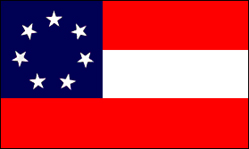
The Stars and
Bars
See
yonder bright
flag as it floats on the breeze,
It is feared by its
foes though it's young on the seas,
Like a bird on the
ocean 'tis met all alone,
But a deed of
dishonor it never has known.
In defending
its
rights much blood has been shed
As an emblem of
this see its borders all red,
And then look to
the center, the blue and the white,
The assurance our
cause it is true just and right.
Long may it
wave
o’er the ocean's dark breast,
Till the sun, moon,
and stars sink forever to rest,
May its gallant
defenders forever prove true,
With this wish, flag of freedom, I bid thee adieu.
--
from a
contemporary poetry collection
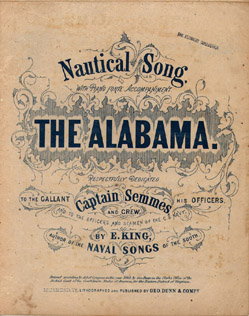
At sea and
land, the CSS Alabama
was the most sung-about
vessel of the Civil War. This song complete is available
here...
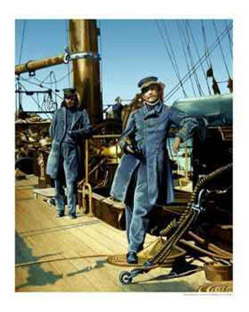
Alabama's
Capt. Raphael Semmes (shown with First Lieutenant Kell) kept a box of
musical instruments aboard for the use of the officers and crew.
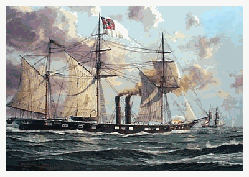
CSS Florida's
exploits are
described below in song penned by one of her seamen.
“The Florida's
Cruise”
By a foretop-man of
the C.S.S. Florida
Air –
“Red, White, and
Blue” (Southern edition).
One evening, off
Mobile, the Yanks they all knew
That the wind from the
north'rd most bitterly blew;
They also all knew,
and they thought they were sure,
They'd block'd up the Florida,
safe and secure..
Cho:
Huzza! huzza, for the Florida's
crew;
We'll range with bold
Maffitt the world through and through.
Nine cruisers they
had, and they lay off the bar,
Their long line to seaward
extending so far,
And Preble he said as
he shut his eyes tight:
I'm sure they're all
hammock'd this bitter cold night.
Bold Maffitt
commanded, a man of great fame
He sail'd on the Dolphin,
you've heard of the same;
He called us all aft,
and these words he did say:
I'm, bound to run out
boys, up anchor, away!
Our hull was well
whitewash'd, our sails were all stow'd;
Our steam was chock
up, and the fresh wind it blow'd
As we crawl'd along,
by them, the Yanks gave a shout;
We dropp'd all our
canvas and open'd her out.
You'd have thought
them all mad, if you heard the curs'd racket
They made upon seeing
oar flash little packet;
Their boatswains did
pipe, and the blue lights did play,
And the great Drummond
light it turn'd night into day.
The Cuyler,
a
boat that's unrival'd for speed,
Quick let slip her
cables, and quickly indeed
She sought for to
catch us and keep us in play,
Till her larger
companions could got under way.
She chas'd and she
chased till at dawning of day
From her backers she
thought she was too far away
So she gave up the
chase and reported, no doubt,
That she'd sunk us and
turnt us somewhere there about.
So when we were out,
boys, all on the salt sea,
We brought the Estelle
to, right under our lee,
And burnt her and sunk
her with all her fine gear,
And straight sail'd
for Havana the bold privateer.
'Twas there we
recruited and took in some stores,
Then kiss'd the
senoras and sail'd from their shores,
And on leaving
their-waters, by way of a joke,
With two Yankee brigs,
boys, we made a great smoke.
Our hull was well
wash'd with the limestone so white,
Which sailors all know
is not quite Christianlike,
So to paint her all
shipshape we went to Green Keys
Where the Sonoma
came foaming, the Rebel to seize.
We put on all sail and
up steam right away,
And for forty-eight
hours she made us some play,
When our coal being
dusty, and choking the flue,
Our steam it slack'd
down, and nearer she drew.
Oh, ho! cried our
captain, I see what's your game!
Clear away the stern
pivot, the Bulldog
by name,
And two smaller dogs
to keep him companie,
For very sharp teeth
have those dogs of the sea.
The Sonoma
came
up until nearly in range,
When her engines gave
out! -- now wasn't that strange?
--I don't know the
truth, but it's my firm belief
She didn't like the
looks of the Florida's teeth.
She gave up the chase
and returned to Key West,
And told her flag
captain that she done her best;
But the story went
round; and it grew rather strong,
And the public
acknowledg'd that something was wrong.
We went on a-cruising
and soon did espy
A fine, lofty clipper,
bound home from Shanghai;
We burnt her and sunk
her in the midst of the sea,
And drunk to Old Jeff
in the best of Bohea!
We next found a ship
with a quakerish name:
A wolf in sheep's
clothing oft plays a deep game --
For the hold of that
beautiful, mild, peaceful Star
Was full of saltpetre,
to make powder for war.
Of course the best
nature could never stand that,
Saltpetre for Boston's
a little too fat,
So we burned her and
sunk her, she made a grand blaze,
She's a star now gone
down, and we've put out her rays.
We next took a
schooner well-laden'd with bread;
What the devil got
into Old Uncle Abe's head?
To send us such
biscuit is such a fine thing,
It sets us all
laughing as we sit and sing:
We next took the Lapwing,
right stuff in her hold,
And that was black
diamonds that people call coal;
With that in our
bunkers we'll tell Uncle Sam,
That we think his
gunboats are not worth a damn.
The Mary
Jane
Colcord to Cape Town was bound,
We bade her heave to
though and swing her yards round,
And to Davy Jones'
locker without more delay
We set her afire, and
so sailed on our way.
-- From The
Civil War In Song And Story,
1879
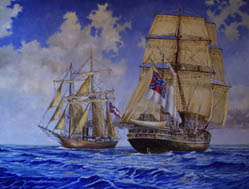 CSS
Florida's
and CSS Alabama
cross paths in a painting,
though they never did in life.
Roll Alabama Roll
-- contemporary
capstan shanty
When the Alabama's
keel was laid
Roll,
Alabama, Roll
It
was laid in the yards of Jonathan Laird,
O
roll, Alabama,
roll
It was laid in
the
yard of Jonathan Laird
It was in the
town of
Birkenhead.
Down Mersey way she sailed
then
She was Liverpool-fitted with guns and men.
Down Mersey way she sailed
forth
To destroy the commerce of the North.
To Cherbourg port she sailed
one day
To collect her share of prize money.
And many a sailor met his doom
When the Yankee Kearsage
hove
in view.
A shot from the forward pivot
that day
Blew the Alabama's
stern away.
Off the three mile limit in
sixty-four
The Alabama
sank to the
ocean floor.
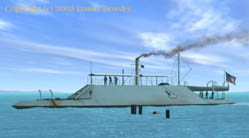
Was
the fiddler in CSS Palmetto State's
minstrel show the same Lt. Chew who regaled officers of CSS Shenandoah?
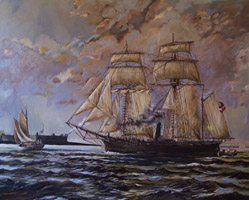
CSS Shenandoah
sails into the Mersey,
the last to lower the flag, in November 1962
|






